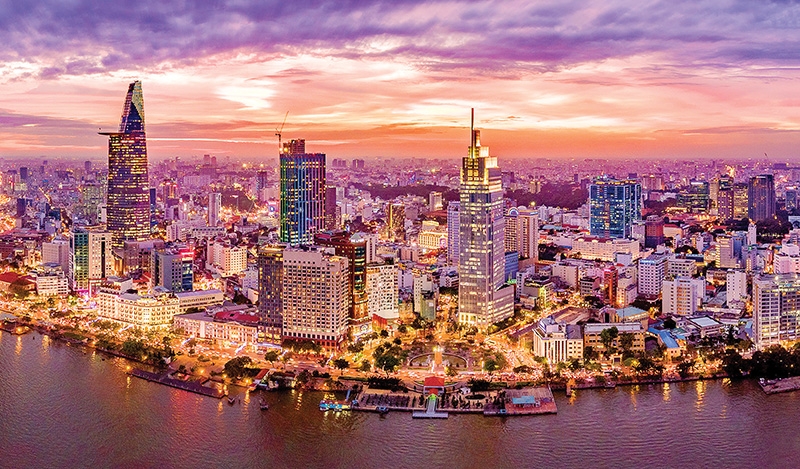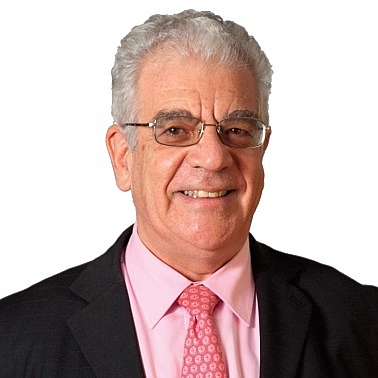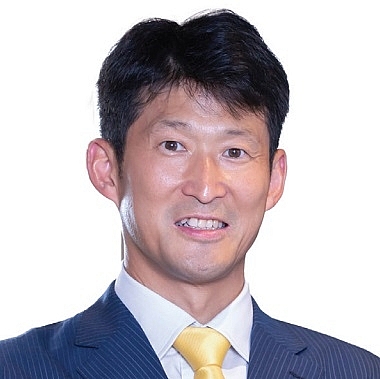Using past lessons to build the future
 |
| Raymond Mallon, a senior economic expert based in Vietnam |
Most external observers recognise Vietnam’s socioeconomic performance since 1975 as a remarkable development success story. From one of the world’s poorest countries, Vietnam has drastically reduced poverty and leapfrogged to middle-income status, while also achieving health and education outcomes typically seen at much higher income levels.
The Party formally adopted central planning as the economic model for the reunified country in 1976 with a focus on state-owned heavy industry, collectivisation of agriculture, and abolishing private enterprises.
The country faced enormous difficulties over the following decade with limited resources, economic instability, food shortages, and negligible private investment, coupled with US led-economic sanctions and cessation of development support from major western development agencies.
There was some decentralised experimentation with economic reforms in the early 1980s targeting market-based production incentives. This experimentation helped demonstrate that economic reforms could improve well-being.
Despite a struggling economy, Vietnam was able to develop a relatively effective and equitable system for delivering public health and education services to the bulk of the population. The resulting improvements in human capability helped lay the foundations for subsequent successful economic reforms.
The relatively equitable distribution of agricultural land early in the reform process was also crucial as it helped ensure broad-based benefits, thus helping build support for such reforms.
Renovation and integration
The economic situation was dire when the doi moi reforms were formally announced in 1986 with food shortages, high poverty rates, hyper-inflation, and macroeconomic instability. External economic inflows from the former Eastern bloc countries were also set to decline further with the break-up of the former Soviet Union.
The reforms were introduced incrementally as the process required “learning by doing” and because extensive consensus building was often needed prior to securing the support needed to implement reforms.
Key initial reforms included allowing farmers to use agricultural land to farm and to allow farm produce to be sold in the markets. Restrictions on small-scale private retail activity were also lifted. The previous sector focus moved from heavy industry to more labour-intensive agriculture, manufacturing, and services. These reforms generated an immediate positive supply response, boosting food availability and economic growth rates.
The successful macroeconomic stabilisation programmes in the late 1980s and early 1990s were also critical to improving living standards and providing the greater certainty needed to mobilise foreign and domestic investment in business activity.
Tax and budget reforms implemented from the late 1980s, together with increased inflows of development support, led to increasing budget revenues, and a greater concentration of public expenditure on providing better public services and infrastructure.
Following the adoption of a foreign investment law in 1987, and subsequent trade reforms, foreign direct investment (FDI) and trade increased dramatically. By the late 1990s trade and FDI to GDP were high relative to other comparable countries. These ratios have continued to grow over the last two decades.
The United States lifted its objections to multilateral (World Bank, International Monetary Fund, and Asian Development Bank) financing operations in 1993 and loosened its trade embargo in 1994, further expanding the range of investment financing and trade opportunities available to Vietnam.
Vietnam actively pursued international trade and economic integration agreements since the 1990s. Membership of ASEAN in 1995 and the ASEAN Free Trade Area was an important turning point in Vietnam economic development and its place within the region.
Vietnam acceded to the World Trade Organization in 2007, the Comprehensive and Progressive Agreement for Trans-Pacific Partnership in 2019 and signed the Regional Economic Cooperation Partnership last year. It has also signed bilateral trade agreements with several countries, notably the EU, Japan, South Korea, and the US.
Rapidly-growing external economic links stimulated competition and facilitated rapid inflows of tech, know-how and ideas in addition to increased capital and access to international markets. Increasing numbers of Vietnamese began travelling abroad for business and leisure further facilitated the transfer of ideas.
The late 1990s/early 2000s enterprise law and related reforms marked an important turning point leading to the gradual emergence of a domestic corporate sector. Prior to these reforms, bureaucratic obstacles had made it difficult for private businesses to grow and develop the scale often needed to engage with foreign investors and to be competitive in international markets.
Since the 2000s, the government had focussed on regular review of, and actions to address, bottlenecks to trade and business. Business-related laws were periodically amended, and bureaucratic and administrative procedures were gradually streamlined despite periodic setbacks.
Government consultations with the business community and other stakeholders to identify constraints became more regular and systematic. This was important as businesses faced increased competition from new business entrants.
The net result is that domestic private output, employment and exports grew at a faster rate than both the state and FDI in recent years. While the pandemic has particularly impacted the domestic private sector over the last 12 months, overall private sector growth is expected to recover strongly from 2021.
 |
| Vietnam has transformed immensely over the past few decades, photo Le Toan |
Reaching developed country status
Vietnam is already close to, or exceeds, average developed country levels for some health and education indicators. However, there remain major gaps relative to average per capita income in developed countries and in areas such as the human living environment.
Reducing these gaps will not be easy, given the challenging global economy, climate change, the ongoing impacts of the pandemic, and a population that will soon start ageing. Rapid urbanisation provides an opportunity for accelerated poverty growth but needs to be managed well to improve living environments in urban and rural areas. Global technological innovations related to Industry 4.0 will disrupt the status quo generating both opportunities and risks.
Sustained broad-based productivity growth will be essential for reaching developed country per capita income levels. Accelerated progress in developing vocational training, higher education, and lifelong learning opportunities, while continuing to strengthen the relevance of primary and secondary education, will be critical to accelerating productivity growth.
Reducing the substantive productivity gaps between informal and formal employment, between women and men, between rural and urban areas, and between different sectors needed could boost growth, generate more benefits for marginalised groups, and promote more equitable economic growth.
Sustained efforts to enhance the competitiveness of domestic private enterprises will also be critical. Policymakers should continue working with the business community, workers, educators and the community to identify and address bottlenecks. Renewed efforts are needed to further reduce corruption.
Benchmarking Vietnam’s performance with neighbouring countries has proved to be an effective tool for holding government agencies accountable for delivering improvements. This approach should be extended to other priority policy areas.
The potential scale economy benefits from urban agglomeration are substantial. Developing urban clusters can facilitate technology transfer and help nurture the development of a creative and innovation-led economy.
A renewed focus is needed to build market economy institutions. There is a need for strong and independent economic regulators (for example, for competition, energy, and telecommunications), to enforce property rights (for instance, courts, and arbitration), to better protect the environment, and to improve transparency, corporate governance, and accountability mechanisms.
A growing middle-income population will demand better environmental management and improved living environments, including better-enforced pollution controls, reduced environmental degradation, improved sanitation and waste management, and increased parks and green areas. Improved living environments will also be important in attracting and retaining the best national and international talent needed to build a creative, knowledge-based economy.
Better environmental infrastructure and management is also needed to sustain improvements in productivity and to facilitate urban agglomerations. In addition to promoting national and international action to slow climate change, increased attention should be given to the impacts of climate change when planning infrastructure development.
It will be increasingly important to boost public expenditure efficiency and to reallocate resources to better reflect the priorities of an increasingly urbanised and middle-class society, an increasingly more sophisticated economy, and an ageing population with declining workforce participation rates.
Despite these real and difficult challenges, there are good reasons for remaining optimistic that Vietnam will achieve its ambitious goals.
| Manoj Barthwal - Chairman, Indian Business Chamber in Vietnam
As a prominent member of ASEAN, and with a host of free trade agreements with the developed world, Vietnam foresees a bigger role in world politics and trade. It, therefore, needs its strategic partnership with India to maintain its superiority and sovereignty in the region. The uncertainty in global trade due to the COVID-19 pandemic has exposed the over-dependence of world trade on China and the importance of the India-Vietnam trade route for international business. There is a growing realisation across the world to have an alternative cost effective manufacturing hub and a reliable source of finished goods and raw materials. Vietnam, due to its proximity to China and India and due to its size, makes for a symbiotic partnership to achieve this goal. Vietnam has shown its exemplary resilience in fighting the coronavirus pandemic, whereas India has shown its manufacturing strength in being the largest supplier of COVID-19 vaccines to the world. In light of the above, I foresee a possibility of very strong business ties between the two nations. My goal as a chairman of the Indian Business Chamber in Vietnam is to improve the understanding of each other’s business interests and inherit strengths, so that we may work towards realising the true trade and investment potential between the two nations and complement each other in getting due recognition on global platforms. Michael Chiu - Chairman, Hong Kong Business Association Vietnam
Vietnam has done a stellar job in handling the pandemic and is admired by most of the world for a country that has limited resources to handle this level of adversary. Vietnam has raised its game to maintain growth during 2020 and the trend continues for a very positive trajectory into 2021. The association has been a great source of information for our community during COVID-19 and we continue to disseminate information about business opportunities in Vietnam and for collaboration opportunities with the Hong Kong business community in Vietnam and in Hong Kong. The investment from Hong Kong and China has not slowed down, and indeed we are seeing many first-time investors in Vietnam. Vietnam is on the road map for many to expand to and this will continue to materialise. The association has been participating at high level conversations through the Vietnam Business Forum and other mediums, representing members and investors to communicate challenges and contributing to administrative reform and Industry 4.0 improvement with the Vietnamese government. These constructive conversations will continue to benefit our community of members and their investments in Vietnam. We continue to assist our members to access the Vietnamese market by sharing our experience, knowledge, and connections. Patrick Downey - Manager, Harrison Assessments Talent Solutions
My recommendation would be for the new government to follow the policies and procedures of the last one. This particularly applies to the COVID-19 pandemic which has been the most adverse event to happen to the world for many years but the past government did a very good job in handling it and keeping it under reasonable control. This needs to continue until it is truly eliminated. Our business with the Success Software entity is focused via our Harrison Assessments Talent Solutions distributorship on assisting companies to recruit, develop, and also train personnel to maximise productivity, professionalism, and results. However, with many organisations reducing staff and business functions because of the adverse effect of COVID-19, the negative reaction has not only been detrimental to them but has seriously and adversely effected our business. Here’s to the end of the COVID-19 pandemic and a bright and prosperous future for all. Kenneth Atkinson - Senior board member, British Chamber of Commerce Vietnam
We would like to congratulate Vietnam on its handling of the COVID-19 pandemic, as all our members have been very grateful for Vietnam’s swift action and successful containment of community spread and all have considered themselves lucky to be in Vietnam. As one of the oldest business chambers in Vietnam, it is especially pleasing to see the growth of Vietnam’s engagement with the international community and its success in the chairmanship of ASEAN in 2020 and election as a non-permanent member of the UN Security Council in 2019, as well as the second tenure as council president during the 2020-2021 period. These efforts help Vietnam attract continuing high levels of foreign investment and should continue to do so going forward. In 2020, we also celebrated the 10th anniversary of the United Kingdom’s strategic partnership with Vietnam and conclusion of negotiations of the UK-Vietnam Free Trade Agreement. This maintains the tariff reductions on trade gained as part of the EU-Vietnam deal and also improves market access for UK companies. Our business centre, which supports trade and investment between our two countries, has already seen an increase in enquiries from the UK, and we have seen a significant increase in trade flows in the first quarter of 2020. We look forward to continuing our engagement with Vietnamese authorities and companies and also to assisting in the growth of UK trade and investment. Aleksandrs Parfjonovs - Head of Vietnam Operations, Grindeks JSC
Generally, compared with all other countries, Vietnam has handled the COVID-19 situation amazingly, as currently in Europe the pandemic is increasing and it has huge impacts on businesses. For example, most of our head office employees must work from home. As for the new government, we have a new health minister who supported a very important law for the pharmaceutical industry and currently our business in Vietnam is actually growing because we can supply more high-quality medicines to the patients, despite COVID-19. I think the Vietnamese government is doing a good job and needs more support to implement the EVFTA, as this new policy was extremely difficult to achieve, but is even more difficult to implement. I personally hope that the vaccination plan will be implemented faster and the government will open borders, especially for foreign experts who are vaccinated to move without quarantine. However, this is a global challenge which every country is working hard to resolve. Greg Ohan - CEO and co-pioneer, The Sentry Vietnam
We have been very fortunate as the government has taken many effective measures to minimise the negative impact of COVID-19. Vietnam learned and drew from its experience in dealing with the SARS virus in 2003. Suspending flights immediately and restricting visas and visitors to contain the spread of the pandemic appears to have paid off. As the number of cases began to drop, gradually lifting social isolation measures and reopening the economy allowed businesses to resume. This has maintained a positive environment for business and set the global spotlight on Vietnam. Like other organisations, we have stepped up to the challenge, having to adapt our business to both protect our employees and to continue serving our customers and communities. Business-model innovation was a key differentiator for our firm during the pandemic. New digital experiences and services in response to changes in customer behaviours and needs, in addition to new strategic partnerships, allowed us to be more resilient. As a result of Vietnam’s policy, we have gained an advantage of resiliency compared to others. While normal business operations will never be the same, thanks to Vietnam’s recovery, both domestic and international investors are increasingly looking to Vietnam. K. M. Leong - General manager, Southeast Asia, Xiaomi International
Despite COVID-19, the explosion of digital transformation and new platforms has been creating so many opportunities for corporations of all sizes. During this uncertain time, technology is the key to opening opportunities for growth, enhancing operations, improving customer experience, and creating new business models. In these changed circumstances, digital transformation would have a bigger effect, enabling enterprises to play a critical role in shaping new realities to support the local market. Xiaomi understands that digital transformation is a long-term process. Xiaomi achieved amazing results across all segments in 2020, and we will keep investing in research and development and support the local market in alignment with the government’s directions. Katsuhiko Usui - General director, Sapporo Vietnam
Vietnam has made great efforts which and achieved great development in economic and social aspects. According to statistics, by the end of 2020, Vietnam’s economy has a scale of about $343 billion, ranking in the top 40 largest economies in the world and fourth in ASEAN. In addition, Vietnam is the only Southeast Asian country to achieve five UN action targets, with groups of measures to reduce CO2 emissions, promote renewable energy, and enhance resilience to climate change. Efforts in many aspects have helped Vietnam’s national brand value reach $319 billion in 2020, ranking 33rd in the world. We believe that Vietnam will continue to be one of the most attractive long-term destinations. Sapporo Vietnam has been operating in this market for 10 years, and we will continue to bring new and unique experiences to Vietnamese consumers, thereby becoming an essential brand in Vietnam. |
What the stars mean:
★ Poor ★ ★ Promising ★★★ Good ★★★★ Very good ★★★★★ Exceptional
Related Contents
Latest News
More News
- NAB Innovation Centre underscores Vietnam’s appeal for tech investment (January 30, 2026 | 11:16)
- Vietnam moves towards market-based fuel management with E10 rollout (January 30, 2026 | 11:10)
- Vietnam startup funding enters a period of capital reset (January 30, 2026 | 11:06)
- Vietnam strengthens public debt management with World Bank and IMF (January 30, 2026 | 11:00)
- PM inspects APEC 2027 project progress in An Giang province (January 29, 2026 | 09:00)
- Vietnam among the world’s top 15 trading nations (January 28, 2026 | 17:12)
- Vietnam accelerates preparations for arbitration centre linked to new financial hub (January 28, 2026 | 17:09)
- Vietnam's IPO market on recovery trajectory (January 28, 2026 | 17:04)
- Digital economy takes centre stage in Vietnam’s new growth model (January 28, 2026 | 11:43)
- EU Council president to visit Vietnam amid partnership upgrade (January 28, 2026 | 11:00)









 Tag:
Tag:


















 Mobile Version
Mobile Version